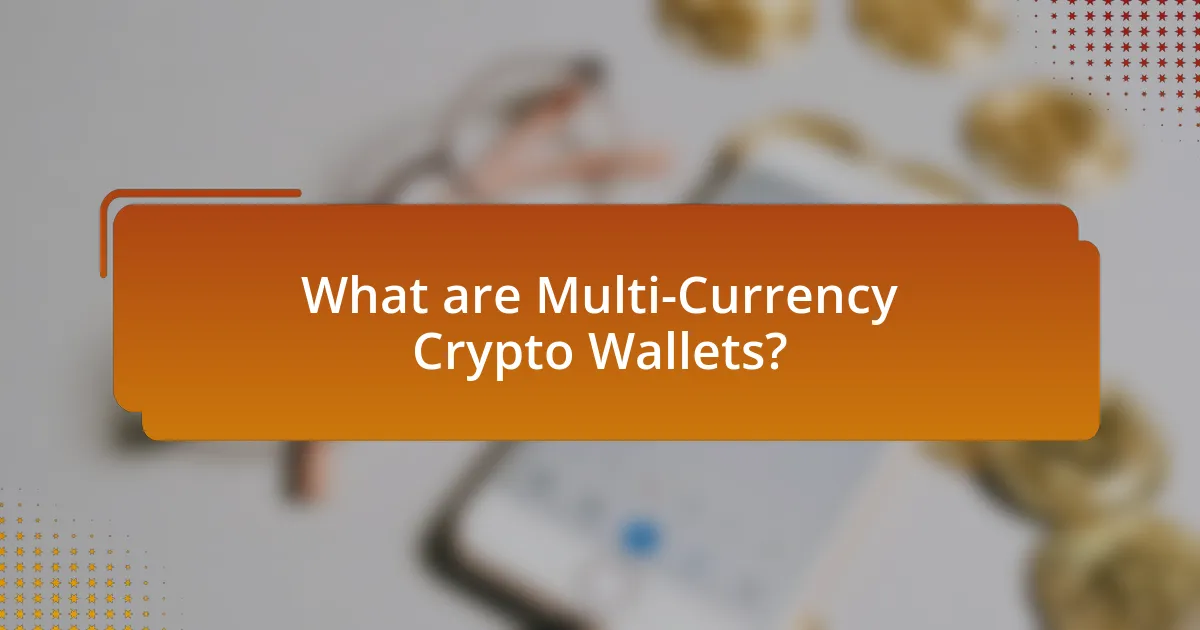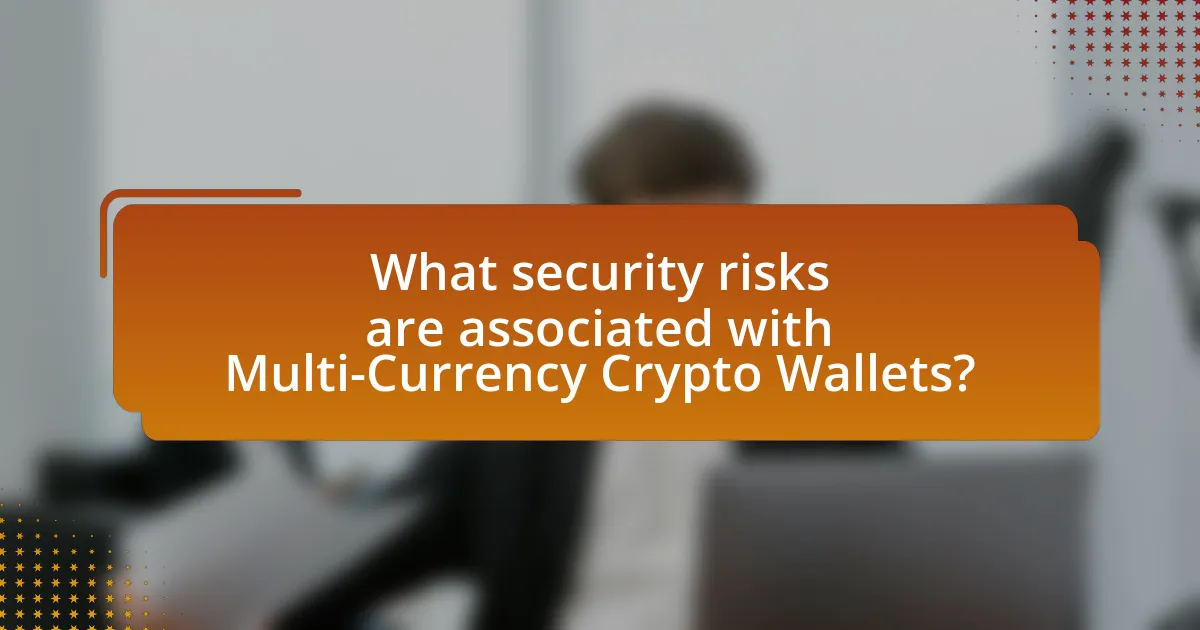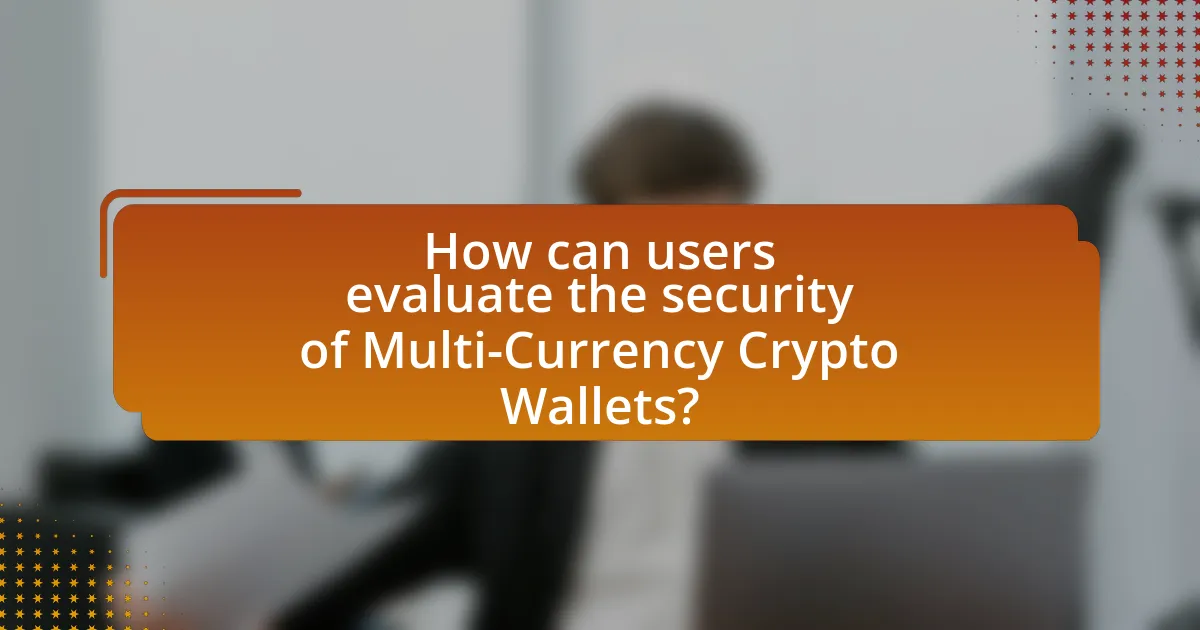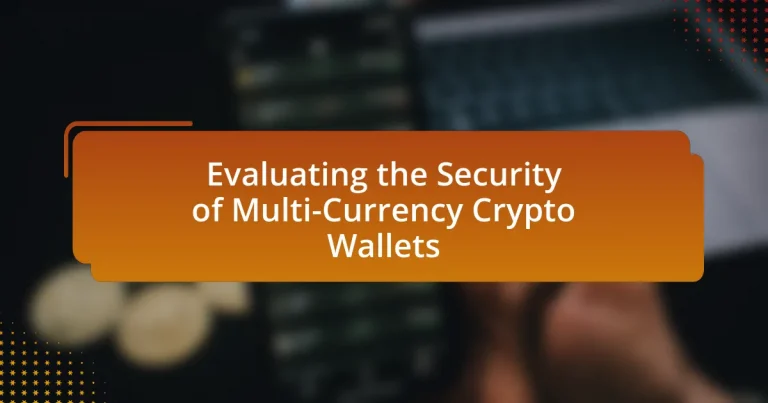Multi-currency crypto wallets are digital tools that enable users to store, manage, and transact with various cryptocurrencies within a single interface. This article evaluates the security of these wallets, discussing their functionality, the types of cryptocurrencies they support, and their key features. It also addresses the security risks associated with multi-currency wallets, including hacking and phishing attacks, and outlines measures users can take to enhance their wallet security, such as implementing strong passwords and two-factor authentication. Additionally, the article highlights best practices for evaluating wallet security and troubleshooting common issues, providing a comprehensive overview for users seeking to protect their digital assets.

What are Multi-Currency Crypto Wallets?
Multi-currency crypto wallets are digital wallets that allow users to store, manage, and transact with multiple cryptocurrencies in a single interface. These wallets support various cryptocurrencies, enabling users to hold assets like Bitcoin, Ethereum, and Litecoin without needing separate wallets for each. The functionality of multi-currency wallets enhances user convenience and simplifies the management of diverse crypto assets, as they often include features such as exchange capabilities and security measures tailored for multiple currencies.
How do Multi-Currency Crypto Wallets function?
Multi-currency crypto wallets function by allowing users to store, manage, and transact with multiple cryptocurrencies within a single interface. These wallets utilize a combination of public and private keys to facilitate transactions across different blockchain networks, enabling users to send and receive various digital assets seamlessly. The wallet software interacts with multiple blockchains, ensuring that transactions are processed correctly according to the specific protocols of each cryptocurrency. This functionality is supported by the wallet’s ability to generate unique addresses for each currency, maintaining organization and security for the user’s assets.
What types of cryptocurrencies can be stored in Multi-Currency Crypto Wallets?
Multi-currency crypto wallets can store a variety of cryptocurrencies, including Bitcoin, Ethereum, Litecoin, Ripple, and many other altcoins. These wallets support multiple blockchain networks, allowing users to manage different types of digital assets in one place. The capability to store various cryptocurrencies is facilitated by the wallet’s underlying technology, which typically includes support for ERC-20 tokens and other token standards, ensuring compatibility with a wide range of cryptocurrencies.
What are the key features of Multi-Currency Crypto Wallets?
Multi-currency crypto wallets allow users to store, manage, and transact with multiple cryptocurrencies within a single interface. Key features include support for various cryptocurrencies, enabling users to hold assets like Bitcoin, Ethereum, and Litecoin simultaneously; enhanced security measures such as private key management and two-factor authentication; user-friendly interfaces that simplify navigation and transaction processes; and integration with decentralized exchanges for seamless trading. Additionally, many multi-currency wallets offer backup and recovery options to safeguard assets against loss. These features collectively enhance user experience and security, making multi-currency wallets a versatile choice for cryptocurrency management.
Why are Multi-Currency Crypto Wallets popular among users?
Multi-currency crypto wallets are popular among users because they allow the storage and management of multiple cryptocurrencies in a single interface. This convenience simplifies transactions and portfolio management, as users can easily switch between different digital assets without needing separate wallets for each currency. Additionally, the growing acceptance of various cryptocurrencies in the market, with over 10,000 different coins available as of 2023, further drives the demand for wallets that can accommodate diverse holdings.
What advantages do Multi-Currency Crypto Wallets offer over single-currency wallets?
Multi-currency crypto wallets provide the advantage of supporting multiple cryptocurrencies within a single platform, which enhances user convenience and flexibility. This allows users to manage various digital assets without needing separate wallets for each currency, reducing the complexity of transactions. Additionally, multi-currency wallets often offer better security features, such as advanced encryption and multi-signature options, which can protect a diverse range of assets more effectively than single-currency wallets. Furthermore, the ability to quickly exchange between different cryptocurrencies within the wallet can facilitate timely trading and investment decisions, optimizing asset management.
How do Multi-Currency Crypto Wallets enhance user convenience?
Multi-currency crypto wallets enhance user convenience by allowing individuals to store, manage, and transact with multiple cryptocurrencies in a single platform. This integration simplifies the user experience, as it eliminates the need for multiple wallets for different currencies, reducing the complexity of managing various private keys and addresses. Furthermore, multi-currency wallets often provide real-time exchange rates and seamless conversion between currencies, enabling users to make transactions more efficiently. According to a report by Statista, the number of cryptocurrencies has grown significantly, making the ability to manage them in one wallet increasingly valuable for users seeking convenience and efficiency in their crypto activities.

What security risks are associated with Multi-Currency Crypto Wallets?
Multi-currency crypto wallets face several security risks, including hacking, phishing attacks, and loss of private keys. Hacking incidents can lead to significant financial losses, as seen in high-profile breaches where millions of dollars worth of cryptocurrencies were stolen. Phishing attacks target users to obtain sensitive information, often through deceptive emails or websites, compromising wallet security. Additionally, if users lose their private keys, they permanently lose access to their funds, as there is no recovery mechanism for lost keys. These risks highlight the importance of implementing robust security measures when using multi-currency crypto wallets.
How can vulnerabilities in Multi-Currency Crypto Wallets be exploited?
Vulnerabilities in Multi-Currency Crypto Wallets can be exploited through various methods such as phishing attacks, malware, and insecure coding practices. Phishing attacks trick users into revealing their private keys or recovery phrases, allowing attackers to access funds. Malware can be used to capture sensitive information or manipulate wallet software, leading to unauthorized transactions. Additionally, insecure coding practices may leave wallets susceptible to exploits like buffer overflows or SQL injection, enabling attackers to gain control over the wallet. These exploitation methods have been documented in various cybersecurity reports, highlighting the importance of robust security measures in wallet development.
What are common attack vectors targeting Multi-Currency Crypto Wallets?
Common attack vectors targeting Multi-Currency Crypto Wallets include phishing attacks, malware, and man-in-the-middle attacks. Phishing attacks often involve deceptive emails or websites that trick users into revealing their private keys or login credentials. Malware can be installed on a user’s device to capture sensitive information or control the wallet remotely. Man-in-the-middle attacks occur when an attacker intercepts communication between the user and the wallet service, potentially allowing unauthorized access to funds. These attack vectors exploit vulnerabilities in user behavior and software security, making it crucial for users to implement robust security measures.
How do phishing attacks specifically affect Multi-Currency Crypto Wallets?
Phishing attacks specifically compromise Multi-Currency Crypto Wallets by tricking users into revealing their private keys or recovery phrases. These attacks often involve fraudulent emails or websites that mimic legitimate wallet services, leading users to input sensitive information. According to a report by the Anti-Phishing Working Group, phishing attacks targeting cryptocurrency users increased by 50% in 2020, highlighting the growing threat to wallet security. When users fall victim to these scams, attackers gain unauthorized access to their wallets, resulting in the loss of funds and assets stored within.
What measures can be taken to secure Multi-Currency Crypto Wallets?
To secure Multi-Currency Crypto Wallets, users should implement strong password protection, enable two-factor authentication (2FA), and regularly update wallet software. Strong passwords should consist of a mix of letters, numbers, and symbols, making them difficult to guess. Two-factor authentication adds an extra layer of security by requiring a second form of verification, such as a text message or authentication app, before accessing the wallet. Regular software updates ensure that any security vulnerabilities are patched, reducing the risk of exploitation. According to a report by the Cybersecurity & Infrastructure Security Agency, using these measures significantly decreases the likelihood of unauthorized access to digital wallets.
How does two-factor authentication enhance wallet security?
Two-factor authentication (2FA) enhances wallet security by requiring two forms of verification before granting access, significantly reducing the risk of unauthorized access. This method typically combines something the user knows, like a password, with something the user has, such as a mobile device for receiving a one-time code. According to a study by Google, implementing 2FA can block 99.9% of automated attacks, demonstrating its effectiveness in protecting sensitive information, including cryptocurrency wallets.
What role does encryption play in protecting wallet data?
Encryption plays a critical role in protecting wallet data by securing sensitive information through algorithms that convert it into an unreadable format for unauthorized users. This process ensures that even if wallet data is intercepted or accessed without permission, it remains unintelligible without the corresponding decryption key. For instance, strong encryption standards like AES (Advanced Encryption Standard) are widely used in crypto wallets to safeguard private keys and transaction details, making it significantly more difficult for cybercriminals to exploit this data. According to a report by the National Institute of Standards and Technology, encryption is essential for maintaining data confidentiality and integrity, thereby reinforcing the overall security framework of multi-currency crypto wallets.

How can users evaluate the security of Multi-Currency Crypto Wallets?
Users can evaluate the security of Multi-Currency Crypto Wallets by examining several key factors, including the wallet’s encryption methods, private key management, and the reputation of the wallet provider. Strong encryption protocols, such as AES-256, ensure that user data is protected from unauthorized access. Additionally, wallets that allow users to control their private keys provide a higher level of security, as this minimizes reliance on third-party services. The reputation of the wallet provider can be assessed through user reviews, security audits, and the history of any security breaches. For instance, wallets that have undergone independent security audits and have a transparent track record are generally considered more secure.
What criteria should be considered when assessing wallet security?
When assessing wallet security, key criteria include encryption strength, private key management, multi-factor authentication, and recovery options. Encryption strength ensures that sensitive data is protected against unauthorized access; for instance, wallets utilizing AES-256 encryption are considered highly secure. Private key management is crucial, as users must control their private keys to prevent theft; hardware wallets, which store keys offline, offer enhanced security. Multi-factor authentication adds an additional layer of protection, requiring users to verify their identity through multiple methods, significantly reducing the risk of unauthorized access. Lastly, robust recovery options are essential for users to regain access to their wallets in case of loss or theft, with wallets that provide seed phrases or backup codes being preferable.
How important is the wallet’s reputation in the crypto community?
The wallet’s reputation in the crypto community is critically important. A reputable wallet is often associated with strong security measures, user trust, and a history of reliability, which are essential for protecting users’ assets. For instance, wallets that have experienced security breaches or have poor customer reviews can deter users, leading to a loss of funds and confidence in the platform. According to a study by Chainalysis, wallets with higher reputations tend to have lower rates of fraud and hacking incidents, reinforcing the idea that reputation directly correlates with security and user safety in the crypto space.
What security certifications should users look for in a wallet?
Users should look for wallets that have security certifications such as ISO/IEC 27001, PCI DSS, and SOC 2. ISO/IEC 27001 certifies that the wallet provider has established an effective information security management system, ensuring the protection of user data. PCI DSS compliance indicates that the wallet meets stringent security standards for handling payment card information, which is crucial for any wallet that processes transactions. SOC 2 certification demonstrates that the wallet provider adheres to strict security, availability, processing integrity, confidentiality, and privacy controls, providing assurance regarding the operational effectiveness of their security measures.
What best practices can users follow to enhance their wallet security?
To enhance wallet security, users should implement strong passwords, enable two-factor authentication (2FA), and regularly update their software. Strong passwords, consisting of a mix of letters, numbers, and symbols, significantly reduce the risk of unauthorized access. Enabling 2FA adds an additional layer of security by requiring a second form of verification, such as a code sent to a mobile device. Regular software updates ensure that users benefit from the latest security patches, protecting against vulnerabilities. According to a report by the Cybersecurity & Infrastructure Security Agency, using these practices can reduce the likelihood of successful cyberattacks by up to 80%.
How can regular software updates improve wallet security?
Regular software updates enhance wallet security by patching vulnerabilities and introducing new security features. These updates address known exploits that hackers may use to compromise wallets, thereby reducing the risk of unauthorized access. For instance, a study by the Cybersecurity & Infrastructure Security Agency (CISA) indicates that timely updates can mitigate up to 85% of known vulnerabilities. Additionally, updates often include improvements in encryption protocols, which further protect sensitive data. By consistently applying these updates, users can significantly strengthen their wallet’s defenses against evolving cyber threats.
What steps should users take to create strong passwords for their wallets?
To create strong passwords for wallets, users should follow these steps: use a combination of at least 12 characters, including uppercase letters, lowercase letters, numbers, and special symbols. This complexity significantly increases the difficulty of password cracking, as studies show that longer and more varied passwords are exponentially harder to guess. Users should also avoid using easily guessable information, such as birthdays or common words, as these can be quickly compromised through social engineering tactics. Additionally, employing a password manager can help generate and store complex passwords securely, reducing the risk of reuse across different accounts, which is a common vulnerability. Regularly updating passwords and enabling two-factor authentication further enhances wallet security, as it adds an extra layer of protection against unauthorized access.
What are the common troubleshooting tips for Multi-Currency Crypto Wallets?
Common troubleshooting tips for Multi-Currency Crypto Wallets include ensuring the wallet software is up to date, verifying network connectivity, and checking for correct wallet addresses. Keeping the wallet software updated is crucial as updates often include security patches and bug fixes that enhance functionality. Verifying network connectivity ensures that the wallet can communicate with the blockchain, which is essential for transaction processing. Additionally, checking for correct wallet addresses prevents errors during transactions, as sending funds to an incorrect address can result in permanent loss. These steps are fundamental in maintaining the security and efficiency of multi-currency crypto wallets.


